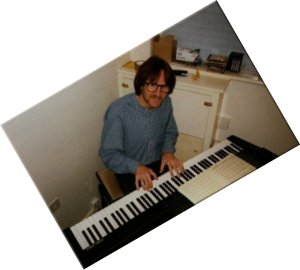In truth, Gregory's metamorphosis from guitarist to keyboard player wasn't quite so haphazard. He didn't simply find himself with the job -- he was seduced into it by the lure of the grand piano. Having taken "the obligatory" piano lessons as a child, Gregory discovered the guitar at age 14. The new instrument had a drastic impact on his piano studies: "My interest in the piano disappeared overnight," he recalls, "and eventually I got fired by my tutor for not practicing."
Joining XTC led Gregory into London's finer recording studios, where, he discovered, the ivory keyboard beckoned from the shadows. "They had wonderful pianos," he recalls, "the sorts of things that I would never get a chance to play anywhere else -- a Steinway or a Bechstein. I spent most of my time tinkering around in the studio while Andy and Colin were in the control room.
"It's a funny thing," Gregory muses, "because as a kid, I was never that good, on the piano, at playing tunes. But finding chords on a piano is so much more satisfying than on a guitar. You can find so many more, much more subtle chords. That's really what I like most about it. I'm able to get more original ideas from the keyboard than from the guitar."
Most XTC songs don't lead Gregory to stray too far from the usual triads of rock and roll, but one song from the band's most recent album, Skylarking, gave his chord-finding sense a workout. Originally given a folky acoustic-guitar setting, "The Man Who Sailed Around His Soul" spontaneously combusted into a too-hip jazz chart in the hands of producer Todd Rundgren. "There was supposed to be a Dave Brubeck type of feel to that track," Gregory says of the song's 7/4 groove. "We didn't actually rehearse it that way, but in the studio Todd decided he wanted to do this rather cheesy late-'50s big-band arrangement. I just sort of fished around for a few chords that were in that element."
When Gregory goes fishing, the treasures he pulls up belie XTC's new-wave affiliations. "I think a lot of my influence came from the '70s," he admits, "listening to Steely Dan and Stevie Wonder. I learned more from Donald Fagen and Stevie Wonder than I did in five years of piano tutoring."
"I love that sort of jazz influence, the tone clusters," he reflects. "You know, it's almost impossible to get a nice tone cluster on the guitar. Three or four notes, just one tone or a semi-tone apart, but played in a certain way and maybe with a certain tone setting on a synthesizer, produce a particular blend that's nice. It's difficult to put into words, but notes at those intervals jammed together with the right sound produce a certain effect. Maybe it's because the ear can't decide which notes it's trying to listen to."
